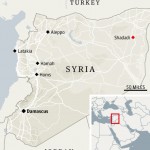A poison gas attack on the 21st of August, according to US officials, killed over 1,400 people in the Syrian capital of Damascus. The international charity Medicins sans Frontiers estimates the number of dead at 355. The government of Bashar Al-Assad is being accused by US government officials of responsibility for the attack. On the 9th September, the United States Congress will begin debate on President Obama’s proposal to intervene militarily. So far the civil war has caused approximately 100,000 deaths and produced at least 1.7 million refugees, but the use of chemical weapons may have crossed a vaguely-defined ‘red line’ which the Obama administration has articulated several times over the past year.
Intervention is difficult to justify in any case, and in this instance it would probably be a mistake. It is unclear what intervention would solve, or what it is even intended to achieve. Military action will surely add to the casualties and chaos it is ostensibly intended to prevent.
Although war naturally provokes strong emotional reactions, it is important that opposition to intervention is intellectually sound. Unfortunately, opponents of intervention too often employ suspect arguments, weakening the case against military action. Following are some such claims.
Continue reading →




